INDIA LAUNCHES GSLV-MARK III CARRYING GSAT-19 SATELLITE
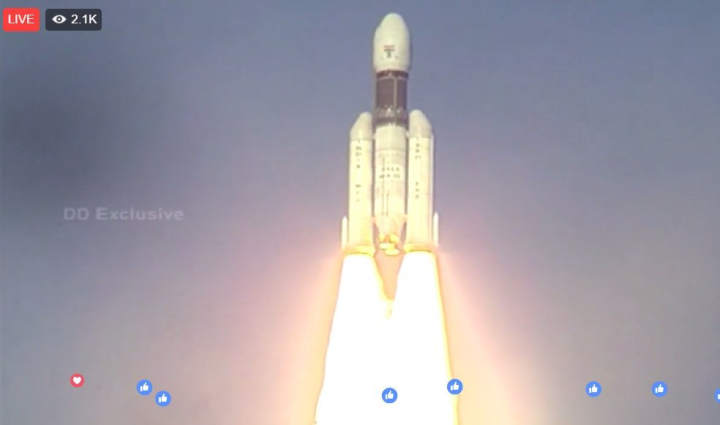
India has successfully launched its communication satellite GSAT-19 with its brand new and heaviest Geosynchronous Satellite Launch Vehicle-Mark III D-1 on Monday evening.
In a copy book style developmental flight, the most powerful ever rocket of the national space agency ISRO slung the satellite in a geosynchronous transfer orbit GTO. From the GTO, the satellite would be taken up to its final geostationary orbit through remote maneuvering, which is the usual practice.
The rocket blasted off from the Satish Dhawan Space Centre, Sriharikotta, precisely at 5.28 p.m. with the satellite weighing 3136 kg during lift off. With a strong deep growl, it rose into the sky breaking free from the second launch pad. After about 16 minutes, the 43.43 metre tall rocket, nick named as “fatty boy,” injected the satellite in space.The ISRO Chairman A.S.Kiran Kumar termed the momentous occasion as historic and congratulated the scientists.
Meanwhile President and Prime Minister have congratulated ISRO for successful launch of GSLV – Mark III carrying GSAT-19 satellite. In a message to ISRO Chairman A.S. Kiran Kumar, the President the nation is proud of this significant achievement. He said the GSLV-Mk III is the heaviest rocket ever made by India and is capable of carrying the heaviest satellites made till date.
In a tweet, Prime Minister Narendra Modi extended his congratulations to the dedicated scientists of ISRO for the successful launch.
The satellite GSAT-19 has an intended life span of 10 years. It is a multi-beam satellite carrying Ka and Ku band forward and return link transponders. It also has an experimental payload called the geostationary radiation spectrometer-GRASP, to monitor and study the nature of charged particles in space and the influence of space radiation on satellites.
The GSLV-Mk III is a three stage rocket. The first stage is fired by two strap-on motors filed with solid fuel. The second stage uses the liquid fuel and the third is the cryogenic upper stage, named as the C25, which is powered by the highly complex indigenous cryogenic engine, CE20. The number 20 denotes the 20-ton thrust it generates for the rocket to reach the intended height with the heavy mass on board.
The ISRO had flown a similar rocket without the cryogenic engine but with 3.7-tonne payload in 2014 mainly to test its in-fight structural stability and its aerodynamics. Based on the collected data with the experimental flight, suitable improvements were made in the rocket by optimising its design features for the developmental flight today with the crucial cryogenic engine.
AIR correspondent reports that the resounding success of the first ever developmental flight of the 4-ton class GSLV Mark III D-1 is hailed as an epoch making event for the national space agency ISRO. It brings the nation yet another step closer towards achieving the goal of total self reliance in satellites launch capacity.
When the rocket makes perhaps a couple of development flights more followed by a few demonstration flights, it would enable India to have three classes of launch vehicles.
The polar satellite launch vehicle PSLV has already established itself as one of the world’s most reliable workhorse of its class. The 2-ton class GSLV Mark II, also known as the “naughty boy,” has witnessed four consecutive successful missions including the las month’s South Asia satellite launch.
The latest and more complex GSLV Mark III, popularly known as the “fat boy,” would help cater to the 4-ton class heavy communication satellite launches. The next goal may be for developing vehicles meant for satellites weighing 6-ton or more, which have a stronger demand globally.
WORLD BANK KEEPS 2017 GLOBAL GROWTH FORECAST UNCHANGED AT 2.7 PCT
World Bank on Sunday maintained its forecast for global growth in 2017 and 2018 unchanged at 2.7 percent and 2.9 percent, respectively, as manufacturing and trade are picking up and confidence is improving.
“A bright spot in the outlook is a recovery in trade growth to 4 percent (in 2017) after a post-financial crisis low of 2.5 percent last year,” said the World Bank in its flagship Global Economic Prospects (GEP) report released on Sunday.
The recovery in trade growth in 2017 is supported by stronger demand from major advanced economies, increased trade flows to and from China, and a diminished drag from weak demand from commodity exporters, said the World Bank.
Stronger trade also reflected the improved outlook for global growth. According to the forecast, advanced economies are expected to grow 1.9 percent in 2017, accelerating from the 1.7 percent growth in 2016, said the World Bank in its flagship Global Economic Prospects (GEP) report released on Sunday.
However, it expected the advanced economic growth to slow to 1.8 percent in 2018 and 1.7 percent in 2019, in line with its forecasts in January.
In emerging market and developing economies, growth is expected to accelerate to 4.1 percent in 2017 from 3.5 percent in 2016. The growth is projected to pick up pace in 2018 and 2019, and will reach 4.5 percent and 4.7 percent respectively.
“After a prolonged slowdown, recent acceleration in activity in some of the largest emerging markets is a welcome development for growth in their regions and for the global economy,” said Ayhan Kose, director for the GEP program at the World Bank.
Growth among the world’s seven largest emerging market economies, namely China, Brazil, India, Indonesia, Mexico, Russia and Turkey, is expected to surpass its long-term average by 2018.
“Recovering activity in these economies should have significant positive effects for growth in other emerging and developing economies and globally,” said the report.
World Bank expected Chinese economy to grow 6.5 percent this year and 6.3 percent in 2018 and 2019, in line with its forecast in January.
Fiscal support is expected to continue to offset monetary tightening, said the World Bank. It expected government policies will continue to support growth, contain financial risks, and encourage a rebalancing of the economy to more of a focus on consumption.
The U.S. economy is projected to grow 2.1 percent this year, 0.1 percentage point lower than the World Bank’s forecast in January. However, it raised the forecast for U.S. growth in 2018, up 0.1 percentage point to 2.2 percent. The growth will again slow to 1.9 percent in 2019, as it moves closer to potential.
“The possibility of significant additional policy changes presents upside as well as downside risks to the U.S. growth forecast for 2018 and 2019,” said the World Bank.
Tax cuts and infrastructure programs could lead to stronger-than-expected growth in the short term, but also to a more rapid increase in interest rates. Changes in trade policies could trigger retaliations from U.S. trading partners, damaging both the U.S. and its trading partners, said the World Bank.
Although global outlook is expected to improve this year, the risks to the global economy are still tilted to the downside, said the bank.
According to the report, increased trade protectionism could derail the trade growth momentum; elevated policy uncertainty could dampen confidence and investment; and the possibility of financial market disruptions still remained.
“For too long, we’ve seen low growth hold back progress in the fight against poverty, so it is encouraging to see signs that the global economy is gaining firmer footing,” Jim Yong Kim, World Bank president, said in a statement on Sunday.
“With a fragile but real recovery now underway, countries should seize this moment to undertake institutional and market reforms that can attract private investment to help sustain growth in the long-term,” said Kim.
CHINA’S FTC-2000 AIRCRAFT EXPORT-VERSION ROLLS OFF
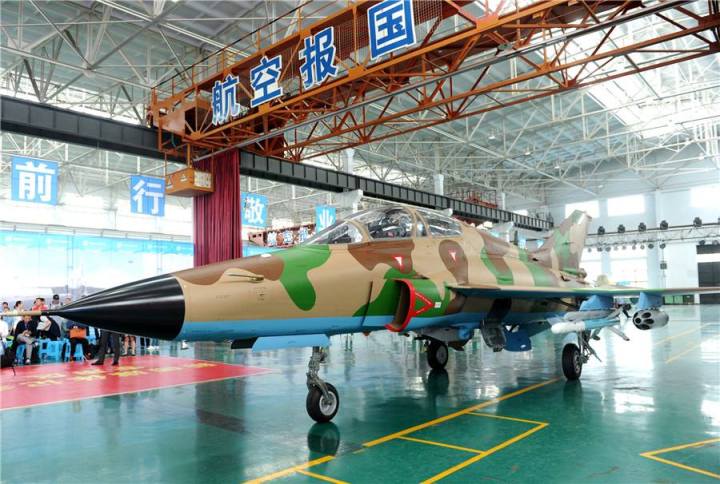
The export version of the China-developed light versatile FTC-2000 aircraft rolled off the production line of the state-owned aircraft developer in Anshun in southwest China’s Guizhou Province Monday.
With its desert-camouflage paint appearance, the FTC-2000 was developed by the Guizhou Aviation Industry Corporation under the state-owned Aviation Industry Corporation of China (AVIC).
As one of the first batch of its model in the global-military trade market, it will be delivered to overseas clients after necessary procedures and tests, according to AVIC.
The FTC-2000, also named Mountain Eagle, or Shanying in Chinese, is a supersonic advanced fighter trainer.
The single-engine light versatile aircraft is a new generation of advanced-fighter trainer designed for advanced training and lead-in fighter training for modern fighters. It is also capable of performing combat missions.
The supersonic aircraft has a mach number of 1.5, and a maximum service ceiling of 16,000 meters.
“It can be used for senior training, elementary combat training and tactical countermeasure training for fighter pilots. And it also has the ability to perform air-to-air and air-to-ground combat,” according to Hu Jianxing, deputy manager and chief designer with the AVIC Guizhou Aviation Industry Corporation.
“It completed the ‘Stall and Spin Flight Test’ within two seconds at the research stage. The FTC-2000 has high safety characteristics,” said Hu, adding the model was highly efficient and reliable.
The FTC-2000 maiden flight was on December 13, 2003. And the model has made two public aerobatic flight displays, at the 2006 and 2016 China Airshow in Zhuhai.
In China, the FTC-2000 is the the main advanced trainer used by the PLA Air Force and the PLA Navy.
“The domestic version and export version have the same flying platform. And both are installed with China’s home-developed WP-13 turbojet engine, which has been tested for high performance,” Hu said. “The export version will be installed with various avionics systems, navigation guidance systems or external stores tailored for overseas client’s demand for multiple missions.”
JAIRAM RAMESH TEACHING RAHUL THE GITA, UPANISHADS
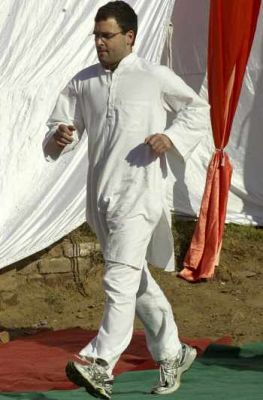
This is latest news when Congress Vice President scion of Nehru- Gandhi Dynasty Rahul Gandhi declares that he is on his way to learn Indian philosophy, books of wisdom globally famous for its universal wisdom amongst the eminent philosophers and scientist and politicians across the nations. Those who read and then adhere to its teaching are men of wisdom, called true Yogi as narrated in Gita , actions then are reflected in everyday life. indeed for Congress rank and file this newsof wisdom, is matter of delight for them.
Congress Vice President Rahul Gandhi is reading the Upanishads and the Bhagwad Gita to ‘take on the RSS and the BJP’.
Rahul is being tutored through every chapter of both the religious texts and it can now be revealed that it is former environment minister and senior Congress leader Jairam Ramesh who has been hand-holding Rahul by using condensed versions of the texts.
Ramesh has memorised all the 18 chapters of the Gita and can chant some of the important shlokas of the Gita without referring to notes.
Many seniors in the Congress called up Ramesh after Rahul went public with the news that he was trying to understand both the Gita and the Upanishads.
Gandhi spoke at length in the Tamil Nadu Congress Committee and evinced a keen interest to read both the texts.
“Nowadays, I study the Upanishads and the Gita since I am fighting the RSS and BJP,” he said addressing party functionaries in Chennai.
“I ask them (RSS men), my friend, you are doing this, you are oppressing people, but it is written in the Upanishad that all people are the same and how come you are contradicting what your own religion says,” party sources quoted him as having told them.
He alleged that BJP does not fundamentally “understand India,” and “understand only Nagpur,” headquarters of the RSS.
DINAKARAN GOES TO JAIL TO MEET AUNT SASIKALA
TTV Dinakaran reaches Bengaluru’s Parappana Agrahara jail to meet VK Sasikala. Dinakaran, who was arrested in the Election Commission in a bribery case, is out on on bail after spending close to two months in Delhi’s Tihar jail.
Sasikala is currently jail term in Parappana Agrahara jail in Bengaluru, after the Supreme Court restored her conviction in the disproportionate assets case. VK Sasikala appointed Dinakaran, her nephew, as her deputy before she went to jail to serve a four-year sentence for corruption. Rediff
SRIDEVI IS BACK WITH MOM!
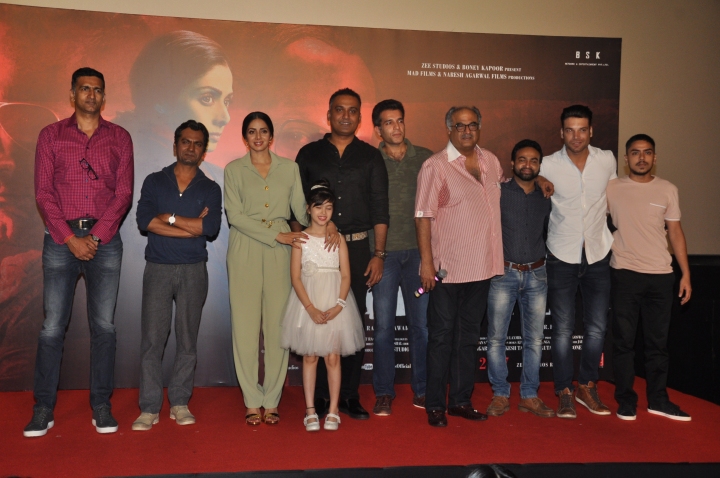
Zee Studios & Boney Kapoor launch the trailer of MOM also starring Nawazuddin Siddiqui & Akshaye Khanna.
3rd June, Mumbai: After wowing audiences with her performance in English Vinglish, Sridevi is back with ‘MOM’ directed by Ravi Udyawar. Interestingly , MOM happens to be Sridevi’s 300th film and 2017 marks her 50th year in films.
The film went on to become a subject of heated discussions as the makers pulled off a casting coup with powerhouse performers like superstar Sridevi , Nawazuddin Siddiqui and Akshaye Khanna being roped in for the film.
If that wasn’t all , the music of MOM has been composed by maestro A R Rahman, making it one of the most sought after films this year.
The trailer was today launched at a popular multiplex in the suburbs by Sridevi, Nawazuddin Siddiqui, director Ravi Udyawar and producers Boney Kapoor and Sujay Kutty from Zee Studios and left audiences at the edge of their seat with its gripping plot and glimpse of the fine performances in store. Also present at the launch were Jhanvi and Khushi Kapoor.
Talking at the event, Sridevi said,” This film was extremely challenging but a very special experience. I’m happy that I got to work with such great actors and we had a great time shooting for the film”.
Added Nawazuddin Siddiqui ,”When I was approached for the film I just couldn’t refuse as it was an opportunity to work with Sridevi. I was even more excited when I saw the references of my look in the film. It was an opportunity to do something different and look so different”.
Said producer Boney Kapoor, “Since this is Sridevi’s 300th film it had to be special. She has never really attempted something like this before and whoever has watched the film believes this is one of her finest performances”.
Sujay Kutty, Business Head Zee Studios added, “At Zee Studios, we strongly believe in backing good content. We are excited to partner with Boney Kapoor for this film and look forward to present it to a wide spectrum of audiences across the world.”
Zee Studios & Boney Kapoor present MOM, a Mad Films & NA film productions. Starring Sridevi , Akshaye Khanna and Nawazuddin Siddiqui, the film has been directed by Ravi Udyawar and music is by A R Rahman.
The film releases 7th July, 2017 in Tamil, Telugu, Malayalam and Hindi!
DAY 2 OF THE 68TH JUNIOR NATIONAL BASKETBALL CHAMPIONSHIP
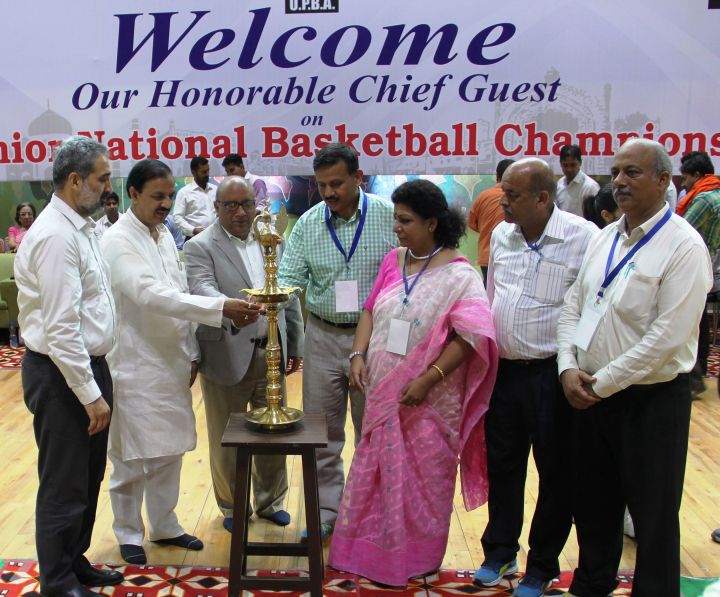
UP girls triumph in their opening game on Day 2 of the 68th Junior National Basketball Championship
Noida, 5th June 2017: The inaguration ceremony of the 68th Junior National Basketball Championship was held today morning on Day 2, here at Shiv Nadar University. The chief guest for the occasion was none other than the local MP from Gautam Budh District, Uttar Pradesh, Dr. Mahesh Sharma who is also the Union Minister of State for Culture and Tourism.
Also present were Mr Chander Mukhi Sharma, Secretary General, BFI; Mr Rajiv Swarup, President of Shiv Nadar University, Dr Mrs Seema Sharma, President, UP Basketball Association (UPBA); Mr Bhupendra Shahi, Hon. Secretary, UPBA and Mr Alok Sharma, Additional Director General, Sashastra Seema Bal and patron of the UPBA.
All the dignitaries noted the wide participation of teams from across the country. They also exhorted the players to exploit the wonderful indoor facilities at Shiv Nadar University to its fullest. The Championship has been dedicated to late Prof. Hari Krishna Awasthi, the former Vice Chancellor of Lucknow University, as 2017 is his centennial birth anniversary. His daughter Prof Abha Awasthi was present on the occasion.
Home team UP girlsopen with win
The Uttar Pradesh girls team pleased the home crowd today morning with a 73-42 win in their opening game against Chandigarh. A strong first half performance ensured a smooth road to the finish line for the UP girls who were led by Vaishnavi’s 26 points. Amrit had 19 points for Chandigarh in the loss.
Karnataka boys remain unbeaten
The Karnataka boys have been impressive in the tournament so far, with another imposing victory today morning. They stormed out of the gates against an undermatched Tripura side, taking the first quarter 35 to 3. This set the tone for the rest of the game as Karnataka cruised to an 83-18 win. The Gujarat boys also registered an emphatic victory against Jharkhand beating them 67-12. Four Gujarat players scored in double digits in the blowout win.
In the other boys’ games this morning, Madhya Pradesh beat Jammu and Kashmir 49 to 38, while Uttarakhand topped Bihar 59-40.
Neighbours AP and Telangana girls triumph
In lower Level 2 action from yesterday evening, the Andhra Pradesh and Telangana girls triumphed against Assam and Bihar respectively. Both the Odisha girls’ and boys’ teams also registered wins late last evening and the Uttarkhand girls beat Tripura 28-15.
Results from 5th June 2017 till 2 pm
Women:
Level 2
Group D
- Uttar Pradesh(Vaishnavi 26, Kavya 12, Shreyasi 11) bt Chandigarh (Amrit 19, Nisha 10) 73-42 (24-15, 20-9, 8-4, 21-14)
Men:
Level 2
Group C
- Madhya Pradesh(Vishwajeet 15, Sudhanshu 14, Yougesh 9) bt JammuandKashmir (Harithik C. 18, Sumit Kumar 10, Gaurav Rajwal 6) 49-38 (6-1, 12-19, 14-8, 17-10)
Group D
- Gujarat(Gohil Mahideep Singh 13, Harsh Shah 12, KuldeepTamaliya 12, Krishnapal Singh Gohil 10) bt Jharkhand (Rahul Kumar 4) 67-12 (23-1, 21-4, 11-3, 12-4)
Group E
- Karnataka(Vishnu R. 14, Pratyanshu 14, Vishal Sharma 11) bt Tripura (Mohit 9, Sachin 7) 83-18 (35-3, 19-4, 8-11, 21-0)
- Uttarakhand (Riyanshu Negi 19, Saksham Gag 12, Nishant 8) bt Bihar(Rahul 23, Gopal Krishna 6) 59-40 (14-5, 19-17, 12-10, 14-8)
Results from 4th June 2017 after 7 pm
Women:
Level 2
Group D
- Odisha(Lipramayee 33, Saraswati 17) bt Chandigarh (Nisha 22, Nidhi 10) 70-46 (11-14, 19-7, 21-13, 19-12)
Group E
- Telangana(NashitaAmeeraA. 16, K. Jyothi 10, B. Angel 7) bt Bihar (Shilpa Rani 7) 55-20 (13-6, 11-4, 21-3, 10-7)
Group F
- Andhra Pradesh (Ch. Vyshnavi 9, K. Swetha 8, N. Saroj 8) bt Assam (Mamtaz Begum 6, K. Dimpal 6) 60-18(12-4, 15-8, 16-4, 17-2)
- Uttarakhand (Jaya 14) bt Tripura (Aarju 4) 28-15 (6-5, 6-6, 8-1, 8-3)
Men:
Level 2
Group F
- Odisha (Srikanta Jena 22, SaratNaik 19, Suresh Das 18, PrasantaBaral 13) bt Puducherry (M. Navaneetha K. 20, VS Lavan 13, N. Charan Raj 10) 85-63(30-15, 16-11, 18-18, 21-19)
About the 68th Junior National Basketball Championship 2017
The 68th Junior National Basketball Championship for Men and Women is being held at Shiv Nadar University in Gautam Budh Nagar District, Noida, Uttar Pradesh from 4th to 11th June 2017. The Championship features 25 men’s teams and 24 women’s teams in the U18 age group, from various Indian States and Union territories, and is being played in a league cum knockout format. Tamil Nadu boys and Karnataka girls are the defending champions from the previous edition held in Puducherry in May 2016.
The teams are grouped into two levels –Level 1 features the top 10 teams from the previous championship divided into two groups of five teams each (Group A and B), while Level 2 features the remaining teams divided into four groups (Group C, D, E, F).
In the league stages, all the teams play each of the other teams in their group once. The top three teams from each of the groups in Level 1 advance directly to the quarterfinals, while the fourth placed teams play pre-quarterfinal games against the top two teams from Level 2.
Over the years, this Championship has provided a platform for the country’s best players in the U18 category to showcase their talents. This allows selectors to identify and shortlist the most promising players and coaches to parachute into national team training camps with an eye towards participation in international events.
About Basketball Federation of India
The Basketball Federation of India or BFI is the governing and controlling body of basketball in India, and is responsible for the development and promotion of the sport at all levels. BFI has been involved in conducting camps, clinics, events, and training sessions at its academies for the development of basketball. BFI came into being in 1935 and took complete control over Indian basketball in 1950. Prior to that time, the Indian Olympic Association handled the conduct of Indian basketball championships. Since 1950, the BFI has been conducting various such championships, from the grassroots to senior team participation in international tournaments. In addition, the BFI has been responsible for the establishment of strong sub-junior and junior level programs. The BFI has to its credit produced several international players of repute, among them 17 have been bestowed with the honour of Arjuna Awards. Earlier in June 2015, 19-year-old Satnam Singh Bhamara made history by becoming the first Indian national to be drafted by an NBA team, when he was selected by the Dallas Mavericks. More information at www.basketballfederationindia.org
No comments:
Post a Comment